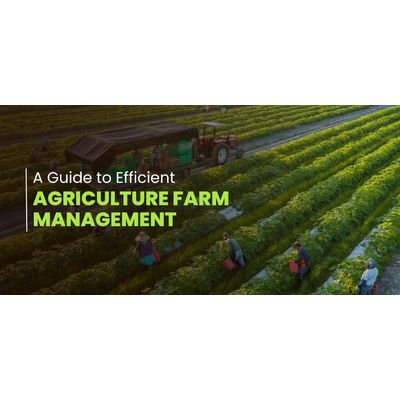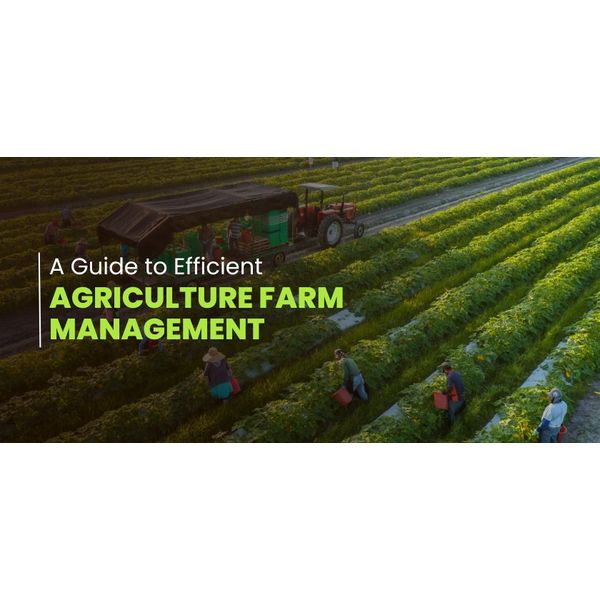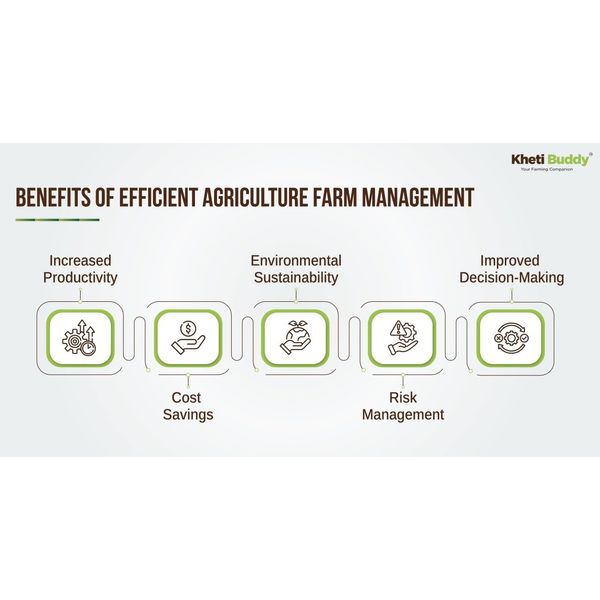

- Home
- Companies
- Kheti Buddy
- Articles
- A Guide to Efficient Agriculture Farm ...

A Guide to Efficient Agriculture Farm Management
Agriculture has always been a fundamental part of human civilization, providing the food and resources necessary for survival. However, as the global population continues to rise and climate change presents new challenges, the need for efficient agriculture farm management has become increasingly critical. Implementing modern technologies and innovative practices can help optimize productivity, reduce waste, and ensure sustainability.

Agriculture farm management involves the strategic planning, organization, and supervision of all farming activities to increase efficiency and productivity. It covers various aspects, including crop production, resource utilization, financial planning, and labor management. The goal is to create a sustainable and profitable farming operation that meets the demands of modern agriculture while minimizing environmental impact.
Farm management requires a deep understanding of agricultural practices, market fluctuations, and technological advancements. Effective farm management combines traditional knowledge with modern innovations to enhance every aspect of farming operations.

Efficient farm management consists of several interconnected components that collectively improve productivity and sustainability. Here are some of the key elements:
Crop Management
Effective crop management is the key component of a successful farming operation. It starts with selecting the right crops suited to your soil and climate, using precise planting techniques, rotating crops to maintain soil health, and managing pests and diseases through sustainable practices.
Resource Management
Resource management is crucial for boosting farm productivity and sustainability. Implementing efficient irrigation systems, maintaining soil health with cover cropping and organic changes, and applying fertilizers based on soil tests help ensure that resources are used effectively.
Financial Management
Rational financial management drives profitability and growth. Developing a detailed budget, tracking costs to identify savings opportunities, and planning for future investments in technology and infrastructure are essential for maintaining financial health and supporting farm operations.
Labor Management
Effective labor management ensures that farm operations run smoothly and efficiently. This includes scheduling labor effectively, providing ongoing training to enhance skills and productivity, and integrating automation and robotics to reduce labor costs and increase operational efficiency.

Effective farm management offers numerous benefits, both in terms of productivity and sustainability. Here are some of the key advantages:
Increased Productivity
By refining every aspect of farming operations, efficient farm management can significantly boost crop yields. Precision agriculture techniques, such as GPS-guided equipment and drones, allow agribusinesses to apply inputs such as water, fertilizers, and pesticides more accurately, resulting in healthier crops and higher yields.
Cost Savings
Efficient resource management helps reduce input costs, such as seeds, water, and chemicals. By adopting advanced irrigation systems and precise nutrient management practices, agribusinesses can lower their expenses while maintaining or even improving productivity.
Environmental Sustainability
Sustainable farming practices, such as crop rotation, cover cropping, and integrated pest management (IPM), help protect natural resources and reduce environmental impact. Efficient farm management promotes the responsible use of water, soil, and other resources, ensuring long-term agricultural sustainability.
Risk Management
Effective farm management involves regular monitoring and data analysis, allowing the identification of potential issues early on and taking preventative measures. This helps eliminate risks associated with pests, diseases, and adverse weather conditions, reducing crop losses and ensuring more stable yields.
Improved Decision-Making
Data-driven decision-making is a key component of effective farm management. By collecting and analyzing data on various aspects of farm operations, agribusinesses can make informed decisions that boost productivity and profitability. Farm management software and other digital tools provide valuable insights that help enhance planting schedules, irrigation, fertilization, and pest control.
The future of agriculture is set to change dramatically, thanks to technological breakthroughs and an increased need for ethical practices. Efficient farm management will play a crucial role in shaping this future. Here are some trends and innovations that will influence the future of agriculture:
Precision Agriculture
The use of precision farming technologies, such as drones, GPS-guided equipment, and soil sensors, will continue to grow. These tools allow the monitoring and management of fields with excellent accuracy, leading to more efficient use of resources and higher yields.
Automation and Robotics
The integration of automation and robotics in farming operations will transform labor management. Autonomous tractors, robotic harvesters, and weeding robots will reduce the need for manual labor and increase operational efficiency.
Data Analytics and Artificial Intelligence (AI)
Advanced data analytics and AI will become increasingly important in farm management. These technologies can analyze vast amounts of data to identify patterns, predict outcomes, and improve decision-making. AI-driven advisory systems can provide real-time recommendations for enhancing productivity and sustainability.
Sustainable Practices
The emphasis on sustainability will continue to grow, with more agribusinesses adopting practices that protect natural resources and reduce environmental impact. Techniques such as regenerative agriculture, agroforestry, and organic farming will become more widespread.
Integrated Farm Management Systems
Unified farm management platforms will become critical tools for modern agribusinesses. These platforms integrate various technologies and data sources, providing a complete solution for efficient farm management.
Efficient agriculture farm management is essential for meeting the challenges of modern farming, from increasing productivity and sustainability to reducing environmental impact and optimizing resource use. By using advanced technologies and innovative practices, agribusinesses can transform their operations and achieve long-term success. A unified agtech platform can effectively assist and achieve efficient agriculture farm management. This is where KhetiBuddy comes in.
With our Unified Agtech Platform, you can gain access to the full potential of your farm. Our advanced crop management solutions provide you with the tools and insights you need to optimize efficiency and ensure sustainability. Are you ready to discover the future of farming?
